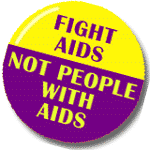
|
A Second Decade of Stigma:
Gregory M. Herek, Ph.D. & John P. Capitanio, Ph.D. Department of Psychology Note: A short version of this paper was published in the American Journal of Public Health, 1993, 83, 574-577. |
|||
|
|
||||
| ABSTRACT |
Background.
This study measured
the pervasiveness of stigmatizing attitudes and beliefs
concerning AIDS among the American public. Because
African Americans have been disproportionately affected
by AIDS, stigma also was assessed in a sample of Black
Americans.
Methods. In 1990-91, telephone interviews were conducted with a general sample of 538 U.S. adults, and a separate sample of 607 African Americans. Respondents were asked about their feelings toward persons with AIDS (PWAs), support for punitive policies, likelihood of avoiding PWAs, and beliefs about HIV transmission. Results. Most respondents manifested some stigma. Only 16.5% of Blacks and 22% of Whites did not give any stigmatizing responses. African Americans were more likely than Whites to overestimate the risk of infection through casual contact, but were less likely to hold negative personal feelings toward PWAs. Overall, females were less likely than males to stigmatize PWAs on measures pertaining to punitive policies and avoidant behaviors. Conclusions. AIDS stigma persists as a problem in the United States. Stigma among African Americans appears to focus on AIDS as a disease that threatens the Black community, whereas Whites' stigma appears to reflect attitudes toward the social groups principally affected by the epidemic. Stigma reduction should be a central goal of AIDS educational efforts. Go to complete text of paper |
. | ||
|
|
|
Home
|
Hate Crimes
|
AIDS
|
Sacramento
|
The Facts
|
Military
|
Sexual Prejudice
|
All rights reserved